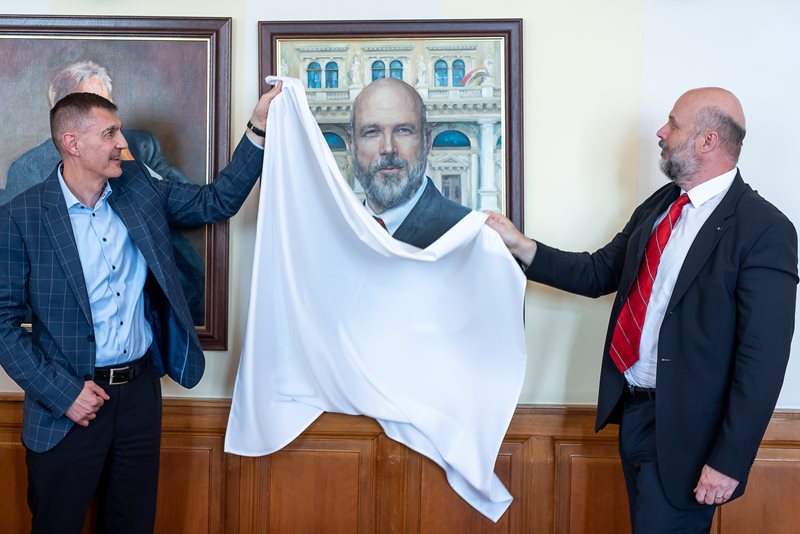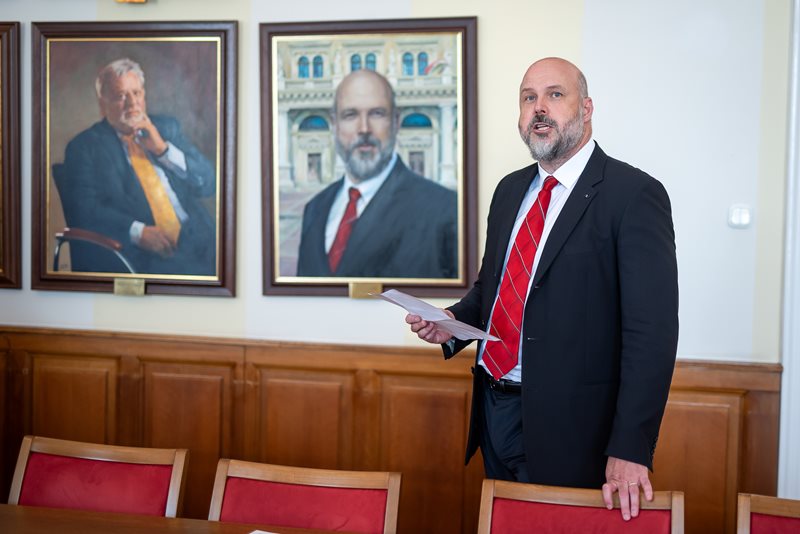Senate: They supported the launch of 11 new Master programmes and adopted the library strategy

The meeting started with a festive event. The painting of Előd Takáts, by Katalin Heinczné Rási, completed the series of portraits of former Rectors of the University displayed on the walls of the meeting room. The painting was unveiled jointly by Lajos Szabó, Acting Rector, and Előd Takáts.

In his welcome speech, Lajos Szabó praised the role of Előd Takáts in increasing the international embeddedness of Corvinus and the number of high-quality Q1-Q2 and D1 publications. Under his leadership, the academic organisation was strategically reorganised and the new institutional structure was created on a disciplinary basis. Előd Takáts as Rector is also responsible for the establishment of the Gyula Illyés Talent Support Programme, which helps talented students from difficult circumstances to prepare for university admission.
Előd Takáts thanked the academic leadership and the senators representing the academic and service sectors for their trust and joint work. He stressed that teamwork has helped the university to become international: the number of international publications has more than doubled, processes supporting the recruitment of international professors have been established, and Corvinus was the first Hungarian university to gain AACSB international accreditation. The fact that Senate meetings are now held in English is proof of this progress. The former Rector stressed that success is a hard-fought battle, that success always depends on small steps, and that, as in football, victory can only be achieved as a team.

The meeting then continued according to the agenda. Lajos Szabó handed over his Senatorial credentials to Ákos Varga, who replaced Patrick Bohl as Dean of Executive and Specialist Postgraduate Programmes.
The panel first took a decision on the proposals concerning the Student Requirements.
The adoption of the new Admission Regulation was supported, which became necessary due to the changes in the admission requirements for Bachelor and Master programmes resulting from the changes in the National Higher Education Act.
They supported the amendment of the Procedure for the assessment of first instance applications and legal remedy requests in relation to student status (Part 2 of SER), with technical clarifications made during the annual review of the Regulations.
Support was given to the adoption of the new Study and Examination Regulations (Part 3 of SER), which also became necessary due to the changes in the National Higher Education Act and the practical experience of the last academic year. Réka Vas, Vice-Rector for Education, said that this is the most comprehensive regulation in the field of education, which has been analysed in detail and in full, with more than 180 proposals for amendments. The actual changes concerned the following main topics: introduction of new concepts, clarification of existing concepts; restructuring of the academic year timetable to allow for a more efficient organisation; clarification of the steps for enrolment; possibility of ranked subject enrolment; clarification of the enrolment of language and physical education subjects; clarification of the rules for acceptance of the subject and credit recognition; clarification of the deadline for exam registration; simplification and clarification of the categories of subject evaluation; creation of a new category of application for Dean’s equity; modification of the rules for the notification of practice period.
The adoption of the new Regulations on Student Fees and Benefits (Part 4 of SER) was supported – with the agreement of the Student Union and the PhD Student Union – and will be subject to a final decision by the Maintaining Body. Réka Vas pointed out that the part of the renewed regulations concerning the scholarship scheme is the result of a long process of consultation, which will motivate students to improve their learning performance and will make the distribution of the available scholarship more balanced.
Support was given to the amendment to the Regulations Ensuring Equal Academic Opportunities for Students with Disabilities (Part 5 of SER), which added additional types of expert opinions acceptable to the University to certify disability.
The adoption of the amendment to the Doctoral (PhD) Regulation (Part 8 of SER) was supported, with some technical, minimal clarifications to comply with the law.
The next item on the agenda was the Corvinus Library Strategy, presented as an annex to the previously adopted Research Strategy. Zoltán Oszkár Szántó, Acting Vice-Rector for Research, said that the Library did not have a strategy adopted by the Senate before, and the aim of the document is to define the development lines and areas of activity that will contribute to the University’s success at the individual and institutional level, building on the current elements of the research infrastructure and the Library’s traditional scope of duties and services. The document was previously approved by the Research Committee and the Presidential Committee, with the unanimous support of the Senators.
The third item on the agenda was the creation and launch of new Master study programmes. At the beginning of this year, the panel adopted the concept of the new Master programme portfolio, on the basis of which the 11 new study programmes were firstly defined, which the University plans to launch from the autumn semester 2025/2026. Réka Vas thanked those involved in the preparation, especially Dániel Havran, Acting Dean, for their intensive work, stressing that the development work actually starts now with the content of the programmes.
Dániel Havran summarised that the new system of Master programmes, which is internationally attractive and in line with market needs, is based on a dynamic system of two-year and one-year Master programmes that build on each other. Of the 11 new programmes now identified, two will be two-year Master programme (General Management, Innovation and Management), both with 4-4 specialisations from the second year (General Management: Strategic Project Management specialisation, International Sports Business specialisation, Diversity Management specialisation, Advanced Supply Chain Management specialisation and Innovation and Management: Agile Entrepreneurship specialisation, Digital Innovation specialisation, Design, Business, Society specialisation, Sustainability Management and Entrepreneurship specialisation). Each of the specialisations will also be available as a stand-alone one-year Master programme. The Master programme of Social Data Science will also be launched as a separate, new one-year programme, as well as a more competitive one-year alternative to the existing two-year full-time MBA. The Senate unanimously supported the creation and launch of 11 new programmes from the 2025/2026 academic year.
The panel then decided on staff and candidacy matters as the fourth item of the agenda. Two months ago, the call for applications for the position of Dean of the Maste study programmes was launched, and one application was received, that of Dániel Havran, who, as acting head, has led the development of the new programme portfolio since October last year. Réka Vas pointed out that Dániel Havran has already demonstrated his professional competence and motivation for the task. The Senate supported the Dean’s application.
The panel also agreed to confer the title of Doctor et Professor Honoris Causa on Paul Shrivastava. Zoltán Oszkár Szántó, Vice-Rector for Research, said that Paul Shrivastava is a globally recognized, innovative scientist in the field of environmental science and corporate sustainability, his cooperation with Corvinus University of Budapest has been ongoing since 2012; he has also held courses, lectured and maintained active scientific relations with researchers from various institutes. He is a frequent collaborator with researchers at the Centre for Economics at CIAS, and since 2019 he has published nine papers with László Zsolnai (one book and eight papers).
A total of 19 different colleagues from Senate constituencies were nominated for this year’s Pro Futura Award. The award, established by the Maecenas Universitatis Corvini Foundation, may be given annually to up to two members of academic staff who have played an outstanding role in the renewal process of the University over a number of years and/or have made a significant contribution to the implementation of the University’s strategy, thereby strengthening the reputation of the institution, and/or have made a valuable contribution to the future of the University through their academic schooling. The award includes an honorary certificate, a memorial plaque and a cash reward amounting to gross HUF 2,000,000. In addition to the Corvinus Award Committee, the Board of Trustees may also request the University Senate, the Presidential Committee or the Student Union for a proposal. Last year, the maintainer did not distribute the award, and in response to a question from a senator, Lajos Szabó said that they had not received any further explanation on this issue. This year, Zoltán Oszkár Szántó, Acting Vice-Rector for Research, Dean of the CIAS, received the most votes from the Senate, and Richárd Szántó, Dean of Bachelor programmes, received the second most votes, making them the Senate candidates for this year’s Pro Futura Award.
After the agenda, Ágnes Zsóka, Vice-Rector for Academic Development, the Chair of the Academic Tenure and Promotion Committee gave information on the latest applications for senior research fellow and associate professor positions. The ATCP supported the appointment of Goran Lešaja (CIAS) as Senior Research Fellow and Gergely Kiss (Institute for Data Analytics and Information Systems), Zombor Berezvai (Institute for Marketing and Communication Studies), Moreno Frau (Institute for Marketing and Communication Studies) and Gregor von Schweinitz (Institute of Economics) as Associate Professors.